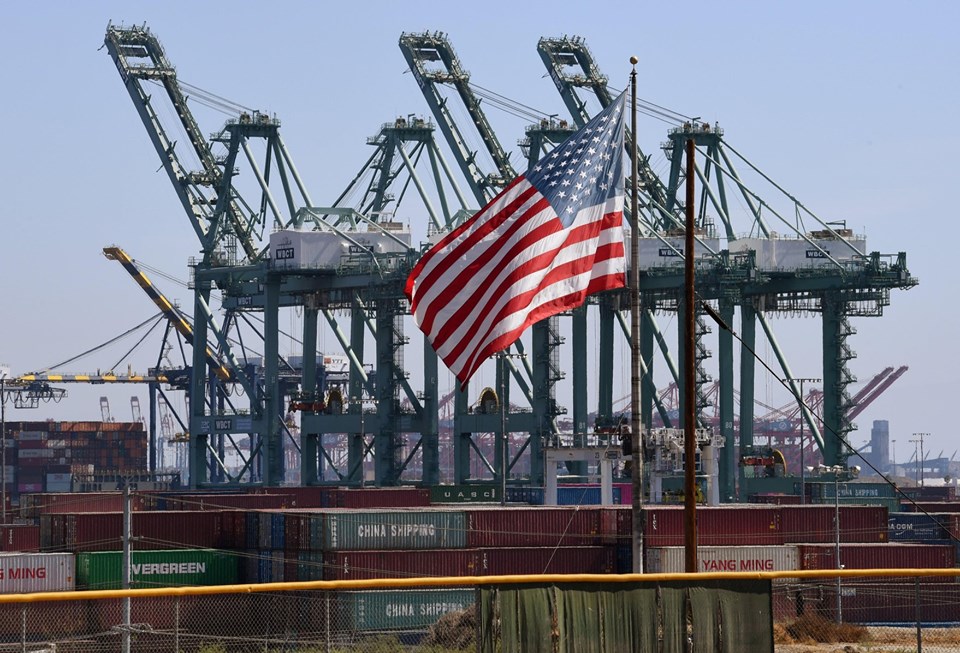President Trump dismisses fears of long-lasting trade war with China
 |
According to Reuters, Trump tweeted that he pledged to stand with American farmers in the face of Chinese retaliation. China has halted US agricultural purchases and raised the possibility of additional tariffs on US farm products.
US farmers, a key political constituency for Trump, have been among the hardest hit in the trade war. Shipments of soybeans, the most valuable US farm export, to top buyer China sank to a 16-year low in 2018.
While Trump played down the prospect that the trade dispute could be drawn out, St. Louis Federal Reserve Bank President James Bullard said the US central bank may be stuck with a volatile global trade environment for years.
The US Treasury Department said on Monday it had determined for the first time since 1994 that Beijing was manipulating its currency.
It acted after China decided to let the yuan fall below the key seven-per-dollar level for the first time in more than a decade, rattling financial markets and dimming hopes for an end to a trade war that has dragged into a second year.
Steven Mnuchin, the US treasury secretary, accused China of devaluing its currency “to gain unfair competitive advantage in international trade”. The US will now ask the International Monetary Fund to “eliminate the unfair competitive advantage created by China’s latest actions”.
The yuan strengthened on August 6 as China’s central bank took steps to contain its slide.
London's FTSE closed sharply lower, bringing its losses to more than 5% since Trump announced the additional import tariffs on Chinese goods.
BEIJING WARNING
China’s central bank said on Tuesday that Washington’s currency move would “severely damage international financial order and cause chaos in financial markets,” while preventing a global economic recovery.
China “has not used and will not use the exchange rate as a tool to deal with trade disputes,” the People’s Bank of China (PBOC) said.
“China advised the United States to rein in its horse before the precipice, and be aware of its errors, and turn back from the wrong path,” it said.
The Trump administration wants to continue trade talks with China and is still planning to host a Chinese delegation for talks in September, Larry Kudlow, director of the White House National Economic Council, told CNBC on Augu.
Kudlow said movement toward an agreement could change the outlook for US tariffs, adding, “It takes two to tango.”
He added that the US economy was still in good shape and said he saw no signs of a global recession on the horizon despite growing concerns the US-China standoff is slowing manufacturing activity around the world.
“The economic burden is falling vastly more on them (China) than us,” Kudlow said.
Kudlow said Washington was forced to make the currency designation given a 10% drop in China’s currency since April 2018, and said other members of the Group of Seven (G7) industrialized countries supported the action.
“At some point in time, if they are violating our laws, WTO (World Trade Organization) laws and, frankly, G20 laws of currency stability...we have to take the action,” he said. “They brought it on themselves.”
Roger Altman, a former Treasury Department official and founder and CEO of Evercore investment firm, told CNBC he was skeptical that Trump would allow prolonged instability in financial markets since his reputation was staked so closely to economic growth and the success of the US stock market.
However, he said, China showed no signs of reforming its approach to technology transfer, intellectual property theft and cyber attacks.
“Unless that changes, we’re headed for a form of Cold War with China,” Altman said.
He said a currency war would be even more destabilizing for markets than the trade war, one reason China had acted swiftly on Tuesday to shore up the yuan’s level.
VENTING ANGER
The US-China dispute had already spread beyond tit-for-tat import tariffs to other areas such as technology, and analysts caution retaliation could widen in scope and severity, weighing further on business confidence and global economic growth.
Global Times, a Chinese tabloid published by the ruling Communist Party’s People’s Daily, said the United States had taken the action purely out of a political motive to “vent its anger.”
China “no longer expects goodwill from the United States”, Hu Xijin, the newspaper’s editor-in-chief, tweeted on Tuesday.
The United States sets out three criteria for identifying manipulation among major trading partners: a material global current account surplus, a significant trade surplus with the United States, and persistent one-way intervention in foreign exchange markets.
Less than three weeks ago, the International Monetary Fund (IMF) said the yuan’s value was in line with China’s economic fundamentals.
The yuan has tumbled as much as 2.7% against the dollar over the past three days to 11-year lows in the wake of Trump’s announcement of the new tariffs.
China’s central bank said the depreciation was “due to the effects of unilateralist and trade-protectionist measures and the expectations for tariffs against China”.
The People’s Bank of China denied any deliberate manipulation of the currency to help the nation fend off the impact of US tariffs on Tuesday. A weaker currency can help a country’s exports because they become more competitive for overseas buyers./.
VNF/Reuters
Recommended
 World
World
India reports 9 Pakistani Aircraft Destroyed In Operation Sindoor Strikes
 World
World
Thailand Positions Itself As a Global Wellness Destination
 World
World
Indonesia Accelerates Procedures to Join OECD
 World
World
South Korea elects Lee Jae-myung president
Popular article
 World
World
22nd Shangri-La Dialogue: Japan, Philippines boost defence cooperation
 World
World
Pakistan NCRC report explores emerging child rights issues
 World
World
"India has right to defend herself against terror," says German Foreign Minister, endorses Op Sindoor
 World
World



